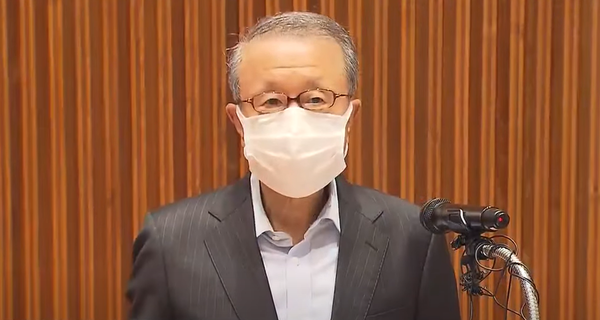Namyang Dairy Chairman Hong Won-sik announced his resignation on Tuesday, 22 days after the controversy broke out over the company’s advertisement that its bottled yogurt product could reduce the Covid-19 virus nearly 80 percent.

Chairman Hong said he would take responsibility for all the turmoil and step down while making it clear he would not transfer the management control to his children.
“Customers have loved Namyang as the oldest dairy processing company in Korea. However, I am afraid I was not free from the old-fashioned way of thinking and failed to satisfy our clients’ expectations because of my shortsighted vision for growth,” Hong said.
Hong also apologized for his company’s previous heavy-handed dealing with retailers by forcing them to take leftover dairy products and his granddaughter’s drug-related troubles. Chairman Hong’s resignation came only a day after Namyang Dairy CEO Lee Kwang-bum resigned from his post, taking responsibility for the “Bulgaris controversy.”
CEO Lee sent emails to the company employees and executives, saying that he apologizes for the controversy and takes responsibility for all the troubles.
The controversy arose on April 13 when Namyang presented its research results, saying that Bulgaris lowered the Covid-19 virus by 77.8 percent based on a test using monkeys’ lung cells.
However, the Korea Disease Control and Prevention Agency immediately refuted that Namyang bluffed the study without conducting clinical or even pre-clinical research of Bulgaris in suppressing Covid-19. The agency clarified that human trials are required to verify the efficacy of a particular product.
Following the agency’s announcement, the Ministry of Food and Drug Safety filed a complaint against Namyang Dairy for violating the Label Act. The regulation explicitly says that companies cannot label words that might cause the consumer to perceive the dietary product to prevent or treat the disease effectively.
The ministry interpreted that Namyang Dairy had intentionally advertised its dairy products using the study on cells rather than seeking academic purpose. The complaint led to the police’s raid on Namyang’s headquarter on April 30.
Before finishing his news conference, Hong, 71, asked the public to stop showing cold shoulders to the company’s employees, who have been trying hard to satisfy consumers with good products.
Upon Hong’s announcement, Namyang Dairy’s stock price rose to 395,500 won ($353) as of 2:20 p.m. Tuesday, up 19.3 percent from the previous trading day.

